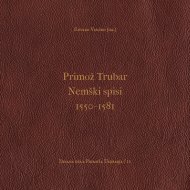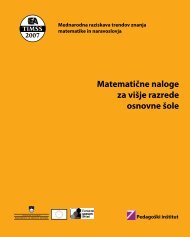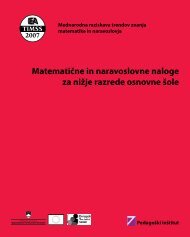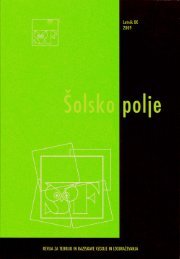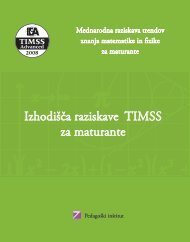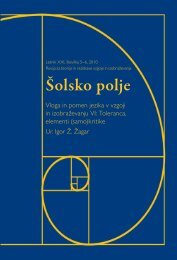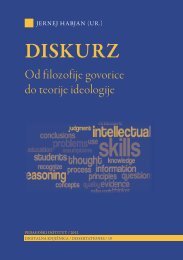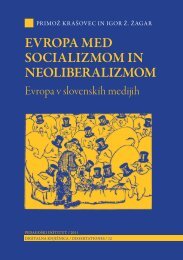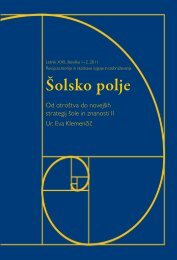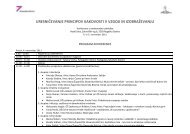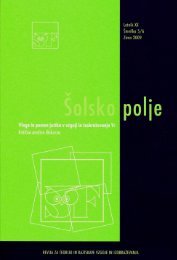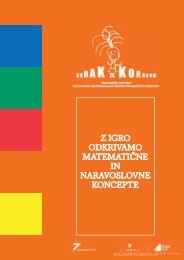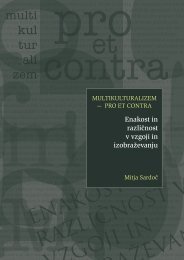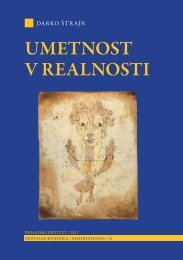- Page 1:
MARCELLO POTOCCONACIONALNIIMAGINARI
- Page 4 and 5:
Knjigo posvečam staršem in sestri
- Page 6 and 7:
Marcello Potocco, Nacionalni imagin
- Page 8 and 9:
8Nacionalni imaginariji - Literarni
- Page 10 and 11:
10Nacionalni imaginariji - Literarn
- Page 12 and 13:
12Nacionalni imaginariji - Literarn
- Page 15 and 16:
Imaginarnoin CorneliusCastoriadis15
- Page 17 and 18:
Imaginarno in Cornelius Castoriadis
- Page 19 and 20:
Imaginarno in Cornelius Castoriadis
- Page 21 and 22:
Imaginarno in Cornelius Castoriadis
- Page 23 and 24:
Imaginarno in Cornelius Castoriadis
- Page 25 and 26:
Imaginarno in Cornelius Castoriadis
- Page 27 and 28:
Narodneidentifikacije27Čeprav sta
- Page 29 and 30:
Narodne identifikacijeko nejasni ka
- Page 31 and 32:
Narodne identifikacijeTakšno vpra
- Page 33 and 34:
Narodne identifikacijeno tradicijo
- Page 35 and 36:
Narodne identifikacijesameznik ali
- Page 37 and 38:
Narodne identifikacijeda mora v dru
- Page 39 and 40:
Literatura,ideološkostin imaginarn
- Page 41 and 42:
Literatura, ideološkost in imagina
- Page 43 and 44:
Literatura, ideološkost in imagina
- Page 45 and 46:
Literatura, ideološkost in imagina
- Page 47 and 48:
Literatura, ideološkost in imagina
- Page 49 and 50:
Literatura, ideološkost in imagina
- Page 51 and 52:
Literatura, ideološkost in imagina
- Page 53 and 54:
Literatura, ideološkost in imagina
- Page 55 and 56:
Literatura, ideološkost in imagina
- Page 57 and 58:
Literatura, ideološkost in imagina
- Page 59:
II Poskusiz imaginarijemin s pod-st
- Page 62 and 63:
62Nacionalni imaginariji - Literarn
- Page 64 and 65:
64Nacionalni imaginariji - Literarn
- Page 66 and 67:
66Nacionalni imaginariji - Literarn
- Page 68 and 69:
68Nacionalni imaginariji - Literarn
- Page 70 and 71:
70Nacionalni imaginariji - Literarn
- Page 72 and 73:
72Nacionalni imaginariji - Literarn
- Page 74 and 75:
74Nacionalni imaginariji - Literarn
- Page 76 and 77:
76Nacionalni imaginariji - Literarn
- Page 78 and 79:
78Nacionalni imaginariji - Literarn
- Page 80 and 81:
80Nacionalni imaginariji - Literarn
- Page 82 and 83:
82Nacionalni imaginariji - Literarn
- Page 84 and 85:
84Nacionalni imaginariji - Literarn
- Page 86 and 87:
86Nacionalni imaginariji - Literarn
- Page 88 and 89:
88Nacionalni imaginariji - Literarn
- Page 90 and 91:
90Nacionalni imaginariji - Literarn
- Page 92 and 93:
92Nacionalni imaginariji - Literarn
- Page 94 and 95:
94Nacionalni imaginariji - Literarn
- Page 96 and 97:
96Nacionalni imaginariji - Literarn
- Page 98 and 99:
98Nacionalni imaginariji - Literarn
- Page 100 and 101:
100Nacionalni imaginariji - Literar
- Page 102 and 103:
102Nacionalni imaginariji - Literar
- Page 104 and 105:
104Nacionalni imaginariji - Literar
- Page 106 and 107:
106Nacionalni imaginariji - Literar
- Page 108 and 109:
108Nacionalni imaginariji - Literar
- Page 110 and 111:
110Nacionalni imaginariji - Literar
- Page 112 and 113:
112Nacionalni imaginariji - Literar
- Page 115 and 116:
Nacionalne težnjeliterarne zgodovi
- Page 117 and 118:
Nacionalne težnje literarne zgodov
- Page 119 and 120:
Nacionalne težnje literarne zgodov
- Page 121 and 122:
Nacionalne težnje literarne zgodov
- Page 123 and 124:
Nacionalne težnje literarne zgodov
- Page 125 and 126:
Nacionalne težnje literarne zgodov
- Page 127 and 128:
Nacionalne težnje literarne zgodov
- Page 129 and 130:
Med mitomin institucijami129Tezi Du
- Page 131 and 132:
Med mitom in institucijami131❙ 14
- Page 133 and 134:
Med mitom in institucijamiv reviji
- Page 135 and 136:
Med mitom in institucijaminovil dve
- Page 137 and 138:
Med mitom in institucijamiKako zapl
- Page 139 and 140:
Med mitom in institucijaminjo nasel
- Page 141 and 142:
Med mitom in institucijamisti irski
- Page 143 and 144:
Med mitom in institucijamitna in ne
- Page 145 and 146:
Med mitom in institucijamiliteratur
- Page 147 and 148:
Med mitom in institucijamivenski je
- Page 149 and 150:
Med mitom in institucijamicepcijo i
- Page 151 and 152:
Med mitom in institucijami151defini
- Page 153 and 154:
Vzemi ljubezen, o Knez! namesto gin
- Page 155 and 156:
Med mitom in institucijaminjima nad
- Page 157 and 158:
Med mitom in institucijamitanskemu
- Page 159 and 160:
Med mitom in institucijamidruštven
- Page 161 and 162:
Med mitom in institucijaminiki Blei
- Page 163:
III Poskusz literaturo
- Page 166 and 167:
166Nacionalni imaginariji - Literar
- Page 168 and 169:
168Nacionalni imaginariji - Literar
- Page 170 and 171:
170Nacionalni imaginariji - Literar
- Page 172 and 173:
172Nacionalni imaginariji - Literar
- Page 174 and 175:
174Nacionalni imaginariji - Literar
- Page 176 and 177:
176Nacionalni imaginariji - Literar
- Page 178 and 179:
178Nacionalni imaginariji - Literar
- Page 180 and 181:
180Nacionalni imaginariji - Literar
- Page 182 and 183:
182Nacionalni imaginariji - Literar
- Page 184 and 185:
184Nacionalni imaginariji - Literar
- Page 186 and 187:
186Nacionalni imaginariji - Literar
- Page 188 and 189:
188Nacionalni imaginariji - Literar
- Page 190 and 191:
190Nacionalni imaginariji - Literar
- Page 192 and 193:
192Nacionalni imaginariji - Literar
- Page 194 and 195:
194Nacionalni imaginariji - Literar
- Page 196 and 197:
196Nacionalni imaginariji - Literar
- Page 198 and 199:
198Nacionalni imaginariji - Literar
- Page 200 and 201: 200Nacionalni imaginariji - Literar
- Page 202 and 203: 202Nacionalni imaginariji - Literar
- Page 204 and 205: 204Nacionalni imaginariji - Literar
- Page 206 and 207: 206Nacionalni imaginariji - Literar
- Page 208 and 209: 208Nacionalni imaginariji - Literar
- Page 210 and 211: 210Nacionalni imaginariji - Literar
- Page 212 and 213: 212Nacionalni imaginariji - Literar
- Page 214 and 215: 214Nacionalni imaginariji - Literar
- Page 216 and 217: 216Nacionalni imaginariji - Literar
- Page 218 and 219: 218Nacionalni imaginariji - Literar
- Page 220 and 221: 220Nacionalni imaginariji - Literar
- Page 222 and 223: 222Nacionalni imaginariji - Literar
- Page 224 and 225: 224Nacionalni imaginariji - Literar
- Page 226 and 227: 226Nacionalni imaginariji - Literar
- Page 228 and 229: 228Nacionalni imaginariji - Literar
- Page 230 and 231: 230Nacionalni imaginariji - Literar
- Page 232 and 233: 232Nacionalni imaginariji - Literar
- Page 234 and 235: 234Nacionalni imaginariji - Literar
- Page 236 and 237: 236Nacionalni imaginariji - Literar
- Page 238 and 239: 238Nacionalni imaginariji - Literar
- Page 240 and 241: 240Nacionalni imaginariji - Literar
- Page 242 and 243: 242Nacionalni imaginariji - Literar
- Page 245 and 246: Summary245The book National Imagina
- Page 247 and 248: Summaryregard to Canadian space/nat
- Page 249: Summarythe context of the common Ca
- Page 254 and 255: 254Uporniki, »hudi farji« in Hudi
- Page 256 and 257: 256Uporniki, »hudi farji« in Hudi
- Page 258 and 259: 258Uporniki, »hudi farji« in Hudi
- Page 260 and 261: 260Uporniki, »hudi farji« in Hudi
- Page 262 and 263: 262Uporniki, »hudi farji« in Hudi
- Page 264 and 265: 264Uporniki, »hudi farji« in Hudi
- Page 266 and 267: 266Uporniki, »hudi farji« in Hudi
- Page 268 and 269: 268Uporniki, »hudi farji« in Hudi
- Page 270 and 271: 270Uporniki, »hudi farji« in Hudi
- Page 272 and 273: 272Uporniki, »hudi farji« in Hudi
- Page 274 and 275: 274Uporniki, »hudi farji« in Hudi
- Page 276 and 277: 276Uporniki, »hudi farji« in Hudi
- Page 278 and 279: 278Uporniki, »hudi farji« in Hudi
- Page 281 and 282: Imensko kazalo281AAlthusser, Louis
- Page 283 and 284: LLacan, Jacques 15, 16, 18, 29, 41,



